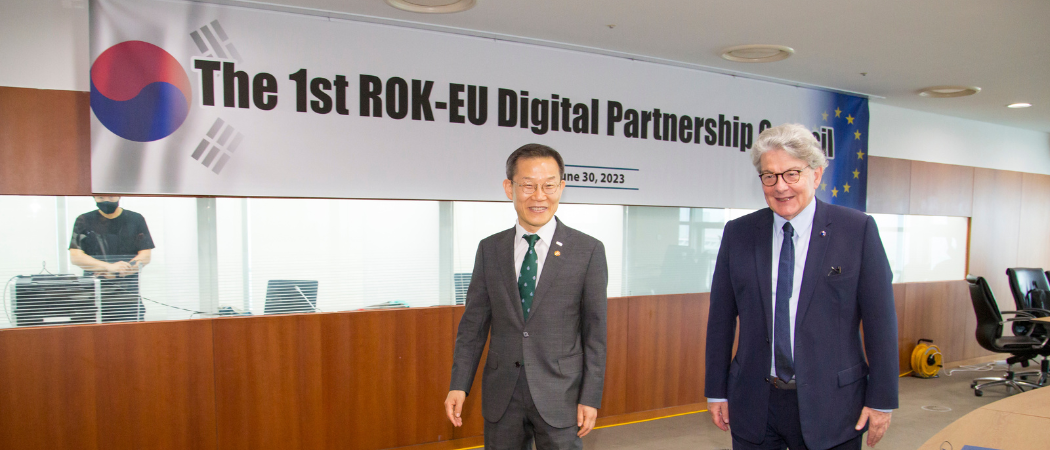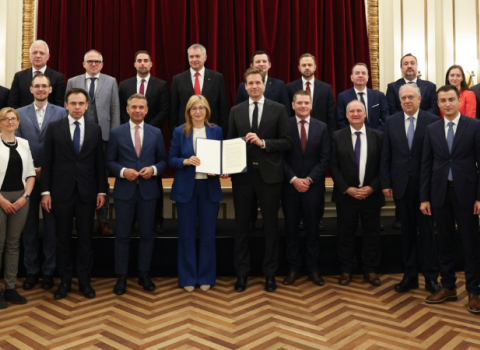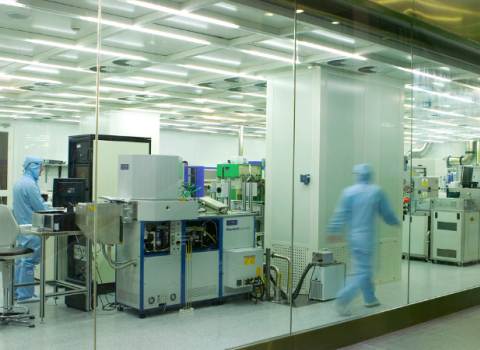€12M joint call is a practical demonstration of how the EU and South Korea are strengthening their ties in a key technology

Korean minister for science and ICT Jong Ho Lee (left) and EU Commissioner for Internal Market Thierry Breton attending the first Ministerial EU-Korea Digital Partnership Council Meeting on June, 30, in Seoul. Photo credits: Lee Jae-Won / European Union
The EU and South have selected four semiconductor projects to get total funding of €12 million, following the launch of a joint call in February.
Half the money for the three-year projects is coming from the Horizon Europe Chips joint undertaking, and half from the National Research Foundation of Korea.
The research will focus on heterogenous integration combining multiple components on one chip, and on neuromorphic chips that are designed to mimic the brain’s ability to adapt and learn, to enable more efficient artificial intelligence systems.
The research and innovation partners from both regions will collaborate in joint research teams, with shared access to research facilities.
“These initiatives, which synergise European and Korean expertise, exemplify our shared commitment to pioneering advancements in AI and semiconductors,” said Thierry Breton, EU Commissioner for Internal Market.
The projects will form the basis of a cooperative network with excellent semiconductor researchers from the EU and South Korea, said Lee Jong-Ho, Korean minister for science and ICT. “We expect to secure cutting edge heterogeneous integration and neuromorphic technologies necessary for next-generation AI semiconductors and autonomous driving applications in the four […] projects.”
The projects will get underway by the end of the year, while South Korea and the European Commission will continue to look for additional opportunities for collaboration.
The joint projects are a concrete outcome of a digital partnership launched in November 2022, and the announcement follows the second meeting of the partners in Brussels, in March 2024.
The cooperation covers technologies including semiconductors, 5G and beyond, quantum, high performance computing, cybersecurity, and artificial intelligence. In March, Brussels hosted the inaugural EU-Korea semiconductor researchers’ forum, and the second forum will be held next year in Seoul.
South Korea also plans to establish a new Korea-EU semiconductor R&D cooperation centre in Brussels. “It is expected to be set up in the second half of this year inside the existing Korea-EU Research Centre (KERC), which will play a bigger role from 2025 as the nation’s strategic R&D centre in Europe. At the moment, Korea is selecting a first director for this new semiconductor cooperation centre,” KERC director general Woohyun Cho told Science|Business.
In March, Korea officially joined Horizon Europe and from 2025 Korean researchers will be able to apply for grants on an equal footing with EU researchers in pillar II of the programme, which is focused on industrial and global challenges.
The EU wants to reduce dependencies on other parts of the world for key technologies, but in the case of semiconductors, the value chain is so complex that no single region can go it alone. The Chips joint undertaking, which launched at the end of last year plans to pursue a strategy of international partnerships and the joint call with South Korea was the first concrete sign of this. It was followed by the news that the UK had joined the Chips joint undertaking.
The Korean Ministry of Science and ICT said 11 Korean research institutes will participate in the joint projects, including Daegu Gyeongbuk Institute of Science & Technology, Sungkyunkwan University, and Hanyang University. In Europe, the consortiums include 14 institutes from nine different countries: Germany, Switzerland, Italy, Spain, Greece, Belgium, Netherlands, France and Austria.
The four joint semiconductor projects are:
- ENERGIZE - Developing brain-like circuits using two-dimensional materials to create energy efficient AI systems
- NEHIL - Creating a laser-based radar system that integrates various technologies for precise distance measurement
- HAETAE - Developing brain-like chips that use light in their circuitry to quickly and efficiently process AI tasks and adapt to new tasks
- ViTFOX - Upgrading AI that processes visual data by using special materials such as ferroelectric oxides that help save power and improve performance





 A unique international forum for public research organisations and companies to connect their external engagement with strategic interests around their R&D system.
A unique international forum for public research organisations and companies to connect their external engagement with strategic interests around their R&D system.